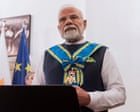
This week, international headlines have been dominated by diverse stories capturing global attention, ranging from political honors, legal rulings, significant spiritual pronouncements, safety legislation, child welfare discussions, to digital health innovations. Each story offers a unique glimpse into the dynamics shaping our interconnected world. Let’s explore these narratives in a calm and insightful manner.
In Trinidad and Tobago, a historic visit is occurring as Indian Prime Minister Narendra Modi is set to be awarded the country’s highest honor. This recognition, organized by the newly appointed Prime Minister Kamla Persad-Bissessar, is being warmly received by the Indo-Trinidadian Hindu community. However, it has also sparked dissent from the largest Muslim organization in the country, highlighting ongoing concerns surrounding Modi’s human rights track record. This visit marks a significant diplomatic engagement, as it is the first time a sitting Indian Prime Minister visits Trinidad and Tobago, underlining the deep historical and cultural ties between the two nations.
Turning towards the United States, a federal court ruling has declared former President Donald Trump’s asylum ban at the US-Mexico border unlawful. This judgment is a significant step in affirming legal protections for asylum seekers. President Trump’s proclamation had described the situation at the southern border as an “invasion,” prompting severe restrictions on asylum claims. This ruling signals a shift in immigration policy and highlights ongoing debates about border security and humanitarian obligations in the US.
In a spiritual context, the Dalai Lama has made a defining announcement regarding the future of his succession, directly challenging China’s position. In a video message ahead of his 90th birthday celebrations, the revered leader emphasized that his successor will be determined by traditional Tibetan practices, overseen by his Gaden Phodrang Trust, rather than any external influence from Beijing. This declaration asserts the preservation of Tibetan spiritual traditions and autonomy in the face of political pressures.
On matters of child welfare, Australia is taking legislative action to enhance childcare safety standards. Following disturbing allegations of abuse in Melbourne, the federal government is expediting legislation to impose stricter checks and sanctions on non-compliant childcare operators. Concurrently, the Victorian government has appointed Jay Weatherill and Pamela White to conduct an urgent review of the sector. These proactive measures reflect a commitment to creating safe environments for young children, while also prompting parents to engage in meaningful conversations with their children about body safety and personal boundaries.
In the United Kingdom, an ambitious digital transformation of the National Health Service (NHS) is underway. Wes Streeting, the health secretary, has unveiled plans to enhance the NHS app, aiming to create a “doctor in your pocket” experience for patients. By leveraging technology, this initiative is set to streamline healthcare delivery, potentially reducing the need for frontline staff by 2035. This proposal comes with optimism for improved patient care through digital efficiency, although it poses potential challenges in workforce dynamics.
Each of these stories, while distinct in nature and geography, contributes to a broader narrative of change and adaptation across the globe. From diplomatic endeavors and legal assertions to cultural resilience, protective legislation, and technological advancements, they encourage us to reflect on the pathways toward a more interconnected and understanding world.
Source: {link}
